When It's Better to Know the Ending
Sometimes it's all about the journey


When I first drafted this, Final Fantasy VII: Rebirth was a week away from release. Sometime before that, screenshots of a previously unreleased scene leaked on a 4chan thread and were later pretty tellingly scraped from the net. These pics accompanied some sketchy timelines of the whole story (most of which were baffling) supplied by self-proclaimed early recipients of the game. There were a lot of magnifying glasses being held over the details, and theorizing took on a more wary edge, one less concerned with the validity of the leaks than with the potential ramifications of them.
Final Fantasy VII is technically a 27-year-old game, so spoilers for it seem to have hit a threshold of acceptance, in that we can freely talk about its major events without feeling like we're ruining the experience for anyone. Kinda:
A message from Final Fantasy VII Rebirth creative director Tetsuya Nomura. #FF7R
— FINAL FANTASY VII (@finalfantasyvii) February 22, 2024
Streaming and posting guidelines: https://t.co/eCEmUz5TGd pic.twitter.com/neSB6VGGqH
Square Enix's legal team got involved with these leaks, effectively nuking all spoiler screenshots, and every discussion of its ending went underground.
While FFVII is an old game, the remake isn't, and even if the development team intended to encourage new players to start the series at Remake (or even Rebirth), the issue of spoilers is a Cait Sith that's already out of the bag. The New York Times got into lukewarm water for posting an article on their front page and as a push notification that blatantly showed a massive spoiler, but it's difficult to take a property like Final Fantasy VII and bring new players fresh into this definitive version – not the spin-offs, not the original, this trilogy – because most of what it's informed by is an extensive understanding of its past. And while I do think Rebirth is, so far, a shining success at remaking the game, I also think that trying to tiptoe past massive spoilers in the lead-up to it is nigh impossible and even actively detrimental to the entire experience.
I played the OG for the first time after Remake, so there were definitely surprises (mad scientist Hojo's attempt at forcing Red XIII x Aerith was...a new one) that contextualized things I'd learned previously only from cultural osmosis. I didn't go into Remake knowing every interaction or setting or encounter. I went into it pretty explicitly knowing only the vibes and visuals of Advent Children, a movie near and dear to my heart, that served as my first introduction to the world of Final Fantasy VII.
Everything I played in Remake was experienced, in part, through that lens – knowing Tifa and Cloud would start a delivery service; knowing Cloud's fall into depression and guilt were exacerbated by the fact that he had contracted a Jenova-born sickness; knowing Reno and Rude would eventually ally with him, and knowing his friends deeply missed him; everything from that movie informed my playthrough.
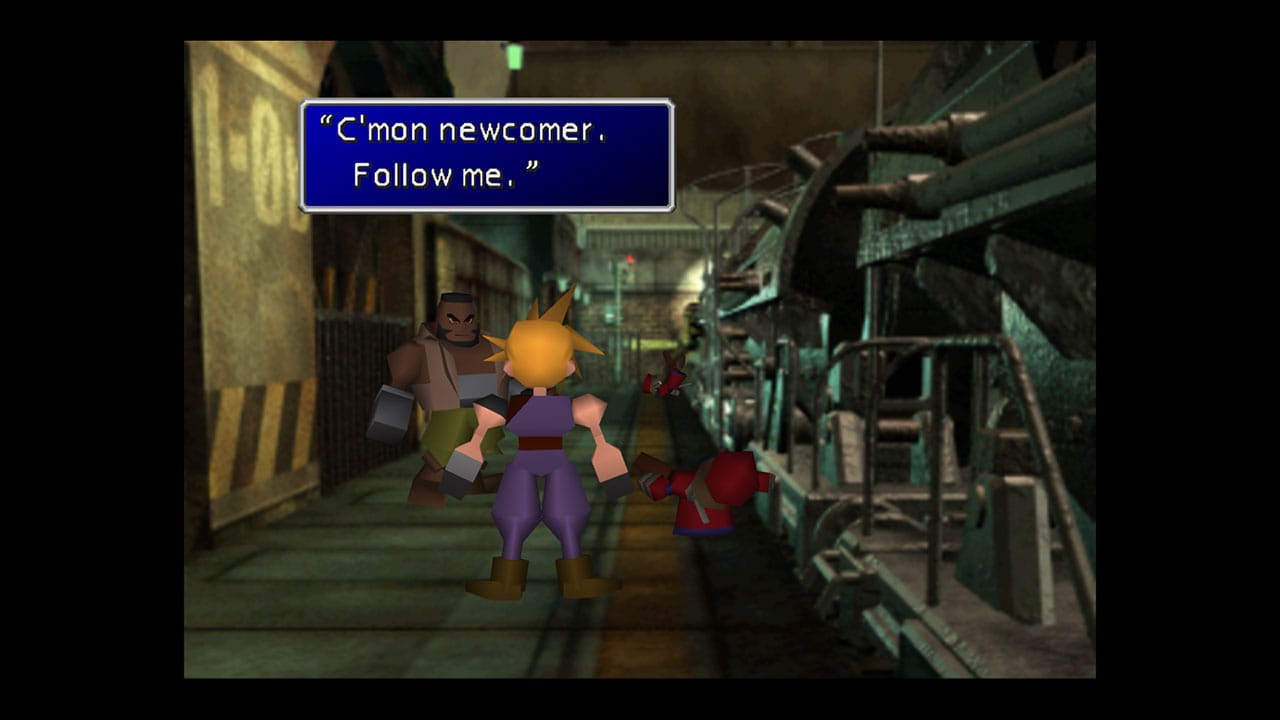
Spoilers are always part of the discussion around remakes of old properties, meta-contextually mixed into the new versions of things, often with astute self-awareness that nods to older fans. Rebirth is absolutely chock full of these easter eggs, some of which are pretty obscure, but the real deal of Rebirth is that it has the unenviable position of reliably re-creating (or subverting) Final Fantasy VII's interminable cultural artifact: the death of Aerith Gainsborough.
I don't know how it will do this, and I'm not really sure I'll care all that much if they mess with it a little. This is a spoiler that's been in the wild for 27 years, rivaling Bruce Willis's Sixth Sense character being dead the whole time, or Gandalf's return in Lord of the Rings. Rather than pull a Resident Evil 4 (which was a very faithful remake), this remake trilogy has gone the route of being more of a re-imagining.
The question of whether Aerith lives or dies isn't really the important part: the question is whether or not it really matters if you already know how it ends.
"Alright, Everyone, Let's Mosey."
Spoilers for media have become a sort of short-form currency of cultural awareness. I know I occasionally fall into the old trap of gaping at people mid-conversation at parties with accusations of living-under-a-rock disease and the oft-recited "you've never seen it?" That's not to say you can't jokingly shame friends for never watching Top Gun, (me, I'm the friend) or that you have to avoid conversations on Fight Club's ending, especially when the basis of these twists or staggering revelations are baked into the crust of the cultural firmament, informing other things built atop it. There are snapshots of revelations that I've had spoiled for me through parodies or satire years removed from the original debut. It really can be a matter of "you had to be there."
But the immediate demands of participation have changed how quickly these events are digested by the culture; far removed are we from the days of containment within a more siloed internet. These big moments are often processed through a ton of different avenues, with some of them going so viral that they escape the confines of smaller fandom ecosystems.
Running Up That Hill's global surge in popularity following Stranger Things Season 4's release meant that a pretty important character scene featuring the song was spoiled after heavy memeification on TikTok. Other moments can be spoiled through idle scrolling with popular sounds, such as the "Chrissy, Wake Up!" remixed soundbite, also from Stranger Things 4, that don't really need their context to make sense.
With 4.3 million views, a riff on Stranger Things' "Chrissy Wake Up" moment makes it into the SpyxFamily fandom. Source: YouTube.
This is a somewhat deeper rabbit hole, in that our real-time experience with fictional properties informs a sort of homogeny in our social media reception of them. Virality is good for media – it can expand interest in it beyond the scope of the intended audience. Just look at This is How You Lose the Time War's meteoritic rise to popularity following a hit tweet by "Bigolas Dickolas Wolfwood" (which, as a big Trigun fan, is extremely gratifying and funny).
This isn't exclusive to spoilers, but it's the quick, often random shifts of the internet's pop culture consciousness that create environments for spoilers to transform into something "referenceable." It's the "oh, it's that guy!" moment. This second-hand encounter can supersede the original, making it a bit impossible to know something as it was originally collectively experienced.
Take Esther Yi's recently released Y/N, which is a literary exploration of fanfiction and obsession. The Y/N titling, without context and to the uninitiated, is mysteriously aesthetic, but when you know it's the shorthand for self-insert fanfic ("your name") and you understand what that is and what it means, the book becomes something else. You can go into it learning this, but if you have a history with the genre (writing it, reading it, loving it, or hating it), it changes interpretation. This sort of transformative relationship to media is why seeing Sephiroth emerging from the flames so early in Remake wasn't at all surprising.
In the original, he didn't appear until later, but his presence is a part of the game's DNA and overall identity, so we can't help but expect him here. His early appearance adds fear and heaviness to his and Cloud's connection, foreshadowing the eventual Nibelhiem flashback and the chain of events that precede it. I think of this with Cait Sith's brief cameo in Remake, which made me silently gasp and point at the screen, but to newcomers, it'd be more like "What the heck is that thing?"
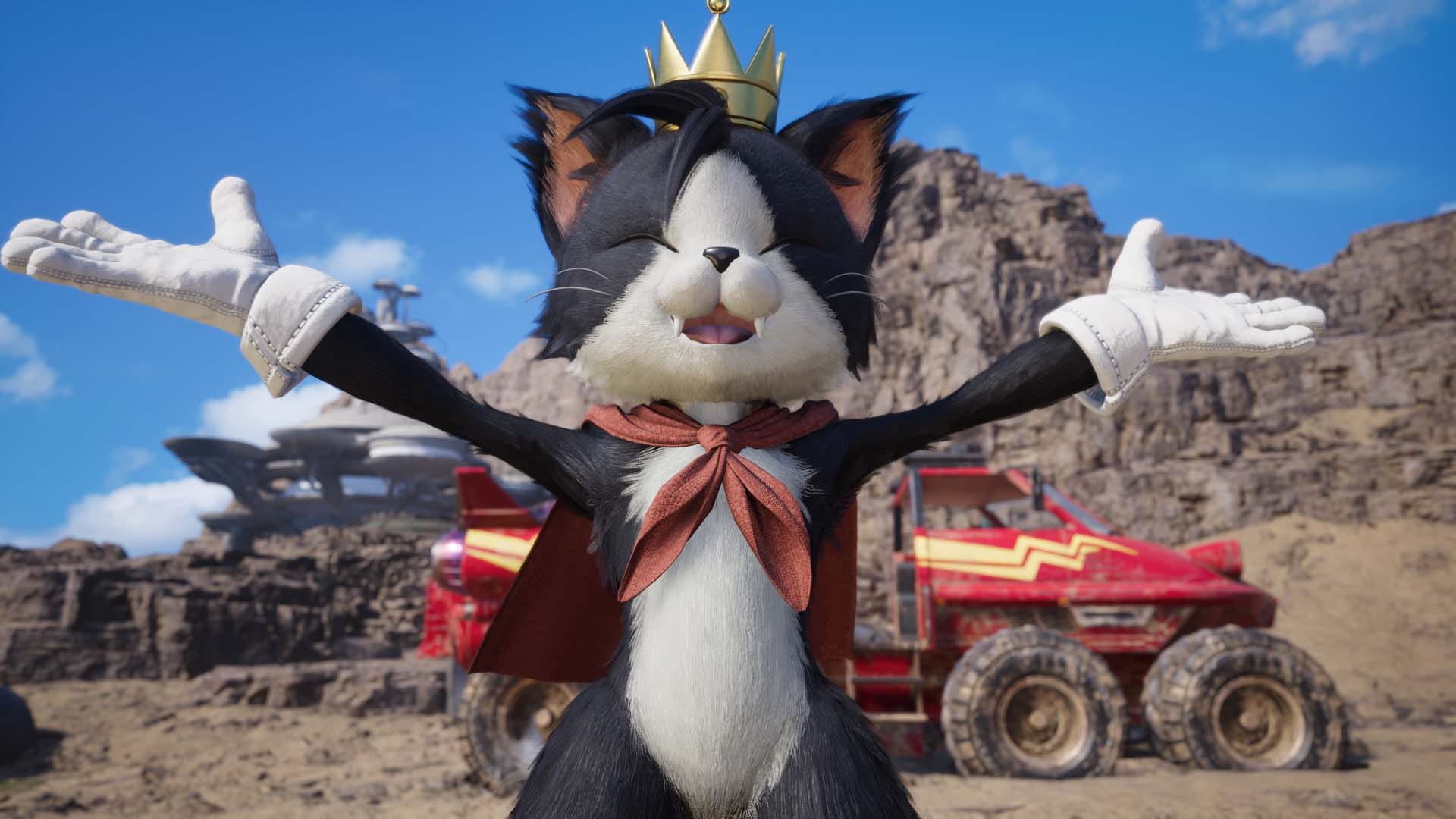
This sly winking at references and nearly giddy immersion into the full scope of the lore is something that Remake and Rebirth, while trying to be new-player friendly, have to readily grapple with. There's a lot they have to be pulling up from the original game, including some weirdness and oddities that, while charming in 2D (and oftentimes unintentionally hilarious), may not work in a fully 3D world that's trying for a more serious vibe. Thankfully, Rebirth pretty much nails this balance, but it's thanks in part to knowing that was the charm of the original. The goofiness, the outlandish designs, that random dolphin; if you don't go in knowing or appreciating the camp, it might come off as being a bit thematically disjointed.
For decades Sephiroth's descent in the Forgotten Capital has been Final Fantasy VII's moment of climactic fame, so under the influence of Final Fantasy VII's entire compilation, the question of whether Aerith lives or dies becomes a palpable thing, and it hangs over the entirety of Rebirth like a pall.
Building Upon the Old
The unfortunate thing about Rebirth is that, in a way, we're spending the whole game waiting for that other shoe to drop. Every encounter we have with Aerith seems primed to tug at our heartstrings. It can feel memorialized, as if she's already attained this sort of "sainthood" in the imminence of her death, a character primed to meet a violent end, so full of light and joy it feels very nearly manipulative. But it works, largely because it's so much a part of her character's legacy. Going into this not knowing her fate makes it all less emotional, even if the game doesn't seem to shy away from foreshadowing her death.
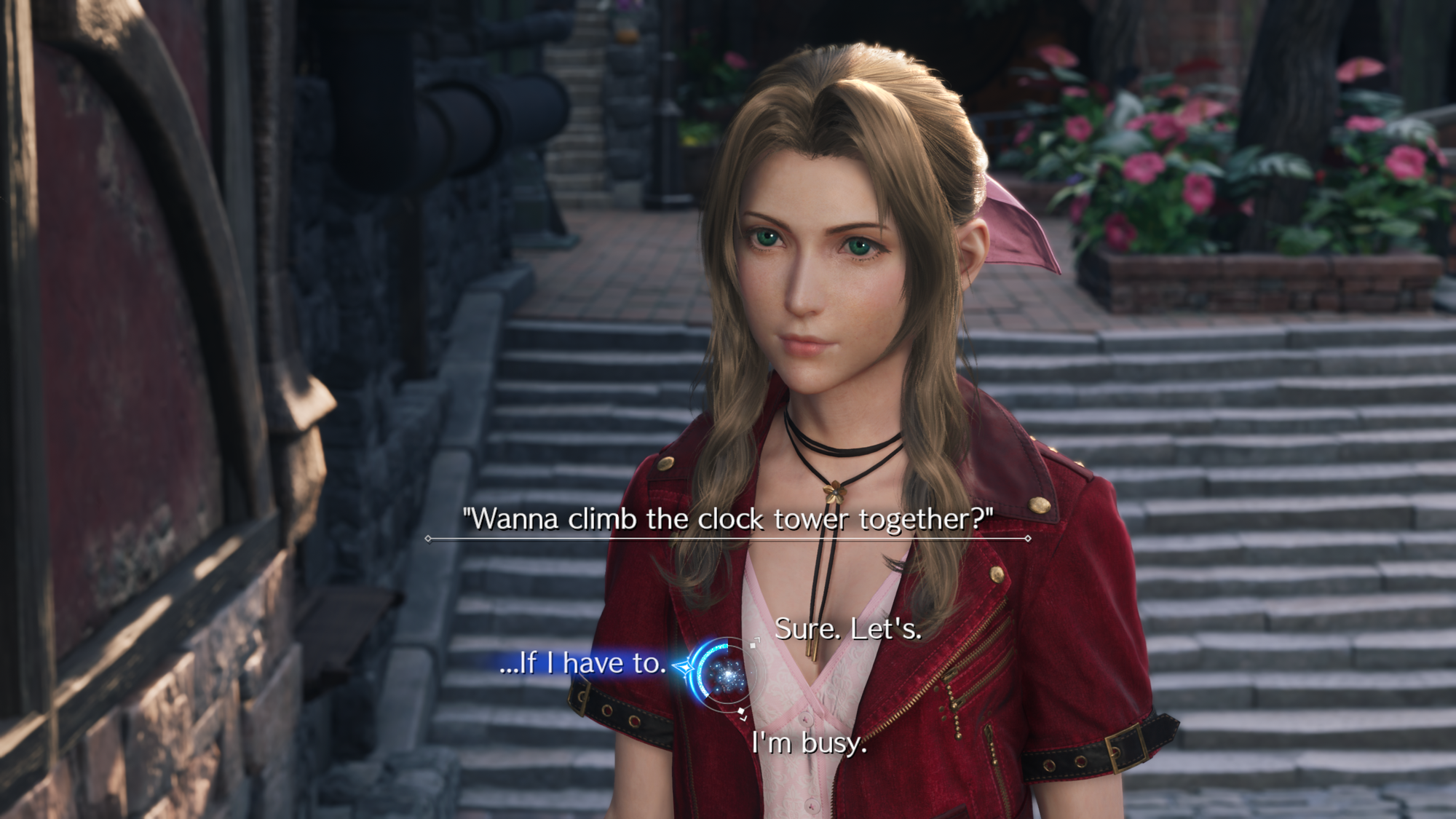
Since the original game's release in 1997, we've had Advent Children, Crisis Core, Dirge of Cerberus, Kingdom Hearts, and even Super Smash Bros. They all feature the characters – whether as cameos or as canon spin-offs – and widen their stories beyond their original measure. Because the remake trilogy is aware of these events, it means that fans of Crisis Core can expect the return of characters like Cissnei, and fans of Dirge of Cerberus (still a banger title) probably enjoyed seeing Deepground's inclusion in Yuffie's Intergrade section.
There are characters that have been far more fleshed out (Avalanche members Biggs, Wedge, Jessie) to the point that losing them in Remake had and will have ramifications for how the characters deal with their legacies – and potentially their survival – in Rebirth. This speculation is fun because it's informed by the past, so it allows us to explore the full breadth of Final Fantasy VII lore and makes us wonder what will come into play when.
One of the most explicit examples of this is in Zack Fair's prominent inclusion. The fact that the opening of Rebirth stars him – a relatively minor, albeit important, character in the original game – speaks to this kind of lore-heavy self-insistence. Since the release of the prequel Crisis Core, he's taken on larger importance within the story, so by starting the newest game as him, it speaks volumes of the remake's intentions. Zack lugs a lifeless Cloud around Midgar – a place he never even made it to in the original – and those interested in the story's complexities will definitely notice how the evil corporation's friendly dog mascot, Champ, is a different breed of dog in this world, so there appears to be two diverging timelines.
It can feel very timey-wimey, multiverse by way of Kingdom Hearts, and to original players that's proved to be something of a sticking point. It re-imagines the story as a mutable thing, upending the expectations of it being a 1:1 recreation. It has plenty of idiosyncrasies to better handle, such as Yuffie and Vincent's recruitment into the party being a not exactly optional thing, and giving their stories (and, for Yuffie in particular, providing a bigger focus on Wutai) more room to breathe. Towns are expanded, sections more explorable – hell, the whole first game was just Midgar – and new characters add depth to what were breeze-bys in the original game. I've found myself invested in so many of these sidequests because they help inform a world I already love, even if they are successfully interesting in general.
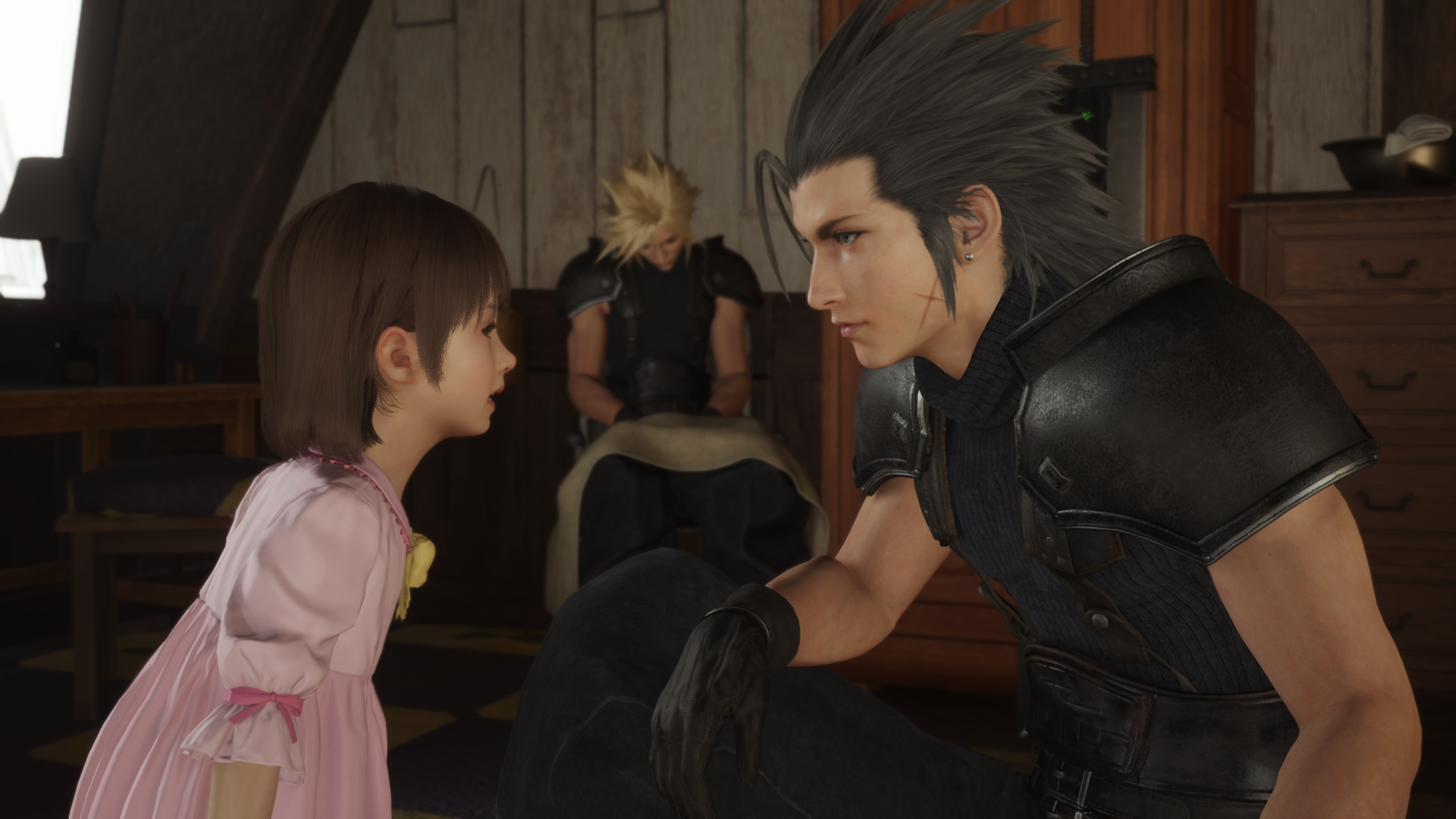
To newcomers, the character of Zack is just another dude who happens to be using Cloud's sword, so none of it means as much if you don't understand the implications of the entire story surrounding them. That unknown in itself might be interesting to newcomers, but having the knowledge of his original fate makes the journey feel new and somewhat bittersweet. Zack also features on the box art of the game, which is meaningful in a way that I'm not sure will be entirely impactful in Rebirth itself.
I'm playing now with my boyfriend occasionally peeking into the room to see what's up. He has almost no knowledge of the characters, so when I gasp or exclaim at scenes that I think will have bigger implications, he is left more-or-less out of the loop. It's why I think, as much as they're trying to make it work, the Remake trilogy just isn't as fun for new fans to the franchise, because the callbacks fall flatter. Then again, I can't see from a newcomer's perspective, so maybe all of these unknowns are independently fascinating.
Trusting the Ride
Rebirth can't help but engage in this conversation with itself, and the developers pretty blatantly call it out. Aerith's death originally came as a shock. There wasn't much prelude to it. It happened. She was gone from the party. Poof. I can imagine the slack-jawed shock of seeing that back in the 90s. Even after years of knowing it, I was startled by how fast, sudden, and permanent it was. It did more than affect players emotionally; it completely altered the gameplay. I mean, there goes the designated healer! The remake trilogy can explore this theme of sudden death and permanence too, but it might mean doing something completely different, like killing off a different character in the end, which would open up an ugly new can of narrative worms, since Aerith's death inevitably saves the planet.
In a way knowing that destination can help us more deeply explore the implications of a story's smaller moments. Final Fantasy VII has had years to ruminate on its ideas, with myriad fans exploring the characters and concepts in their own ways, and different teams of developers and creatives enriching the world, so I think that time given for the old spoilers to percolate means they're not really spoilers anymore – they're part of the framework of understanding the game. Cloud's story is more fascinating for what we already know because we feel his moments of weakness more deeply in a sort of retroactive pity; it's informed by his shame and trauma and Sephiroth's influence. Knowing our antagonist's goals, what he's like as a boss fight, his mockery of Cloud, his role in Advent Children – all of it builds the case for Sephiroth's current form, while his increasingly cryptic messaging in the remake trilogy fosters new questions of intent.
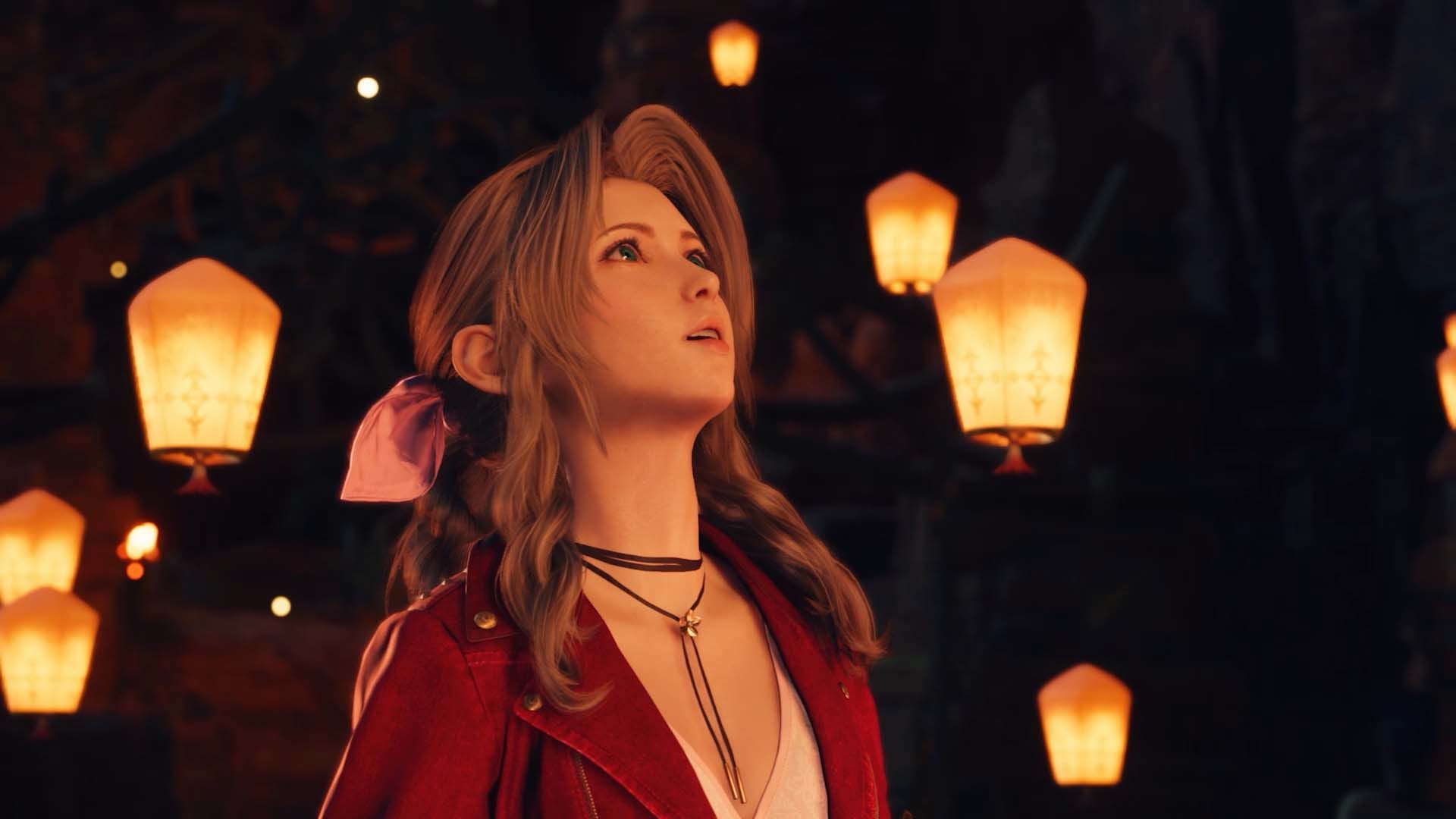
Maybe Final Fantasy VII is a special case. Before Rebirth was released I waded into spoiler speculation threads because I figured – what could they possibly spoil? I know how this ends. And the development team made it clear that they were sticking to the blueprints. But even if Aerith dies, Rebirth promises to do something new with the existing story. It effectively "freed" the cast last time, and so far in my playthrough (Chapter 9 right now), there seems to be less focus on changing the story and more on celebrating what already exists.
Professor Hojo can still be found sitting on a beach in Costa Del Sol, Red XII still ends up dancing in that goofy goddamn Shinra uniform, we still get the buggy. New additions, like Aerith and Tifa's friendship deepening, or Barret and Yuffie's banter, or new minor characters that aid in their journey, add value and heart to the experience. Open-world elements help this too. I adore the inclusion of the Life Springs, even if it's an exploration checklist gimmick. It adds context to what's been lost, reminding us of what the world might have been before Shinra ravaged it.
I wish I could play this game without knowing a thing about it and how it's supposed to end, but it's impossible to get the same feelings without the foreshadowing of it all seeping presciently into every encounter. But there is wonder in this newness, where the game revels in being just a little bit more than what it used to be. What we know just makes it more exciting and gives us room to fall in love with it all over again.
